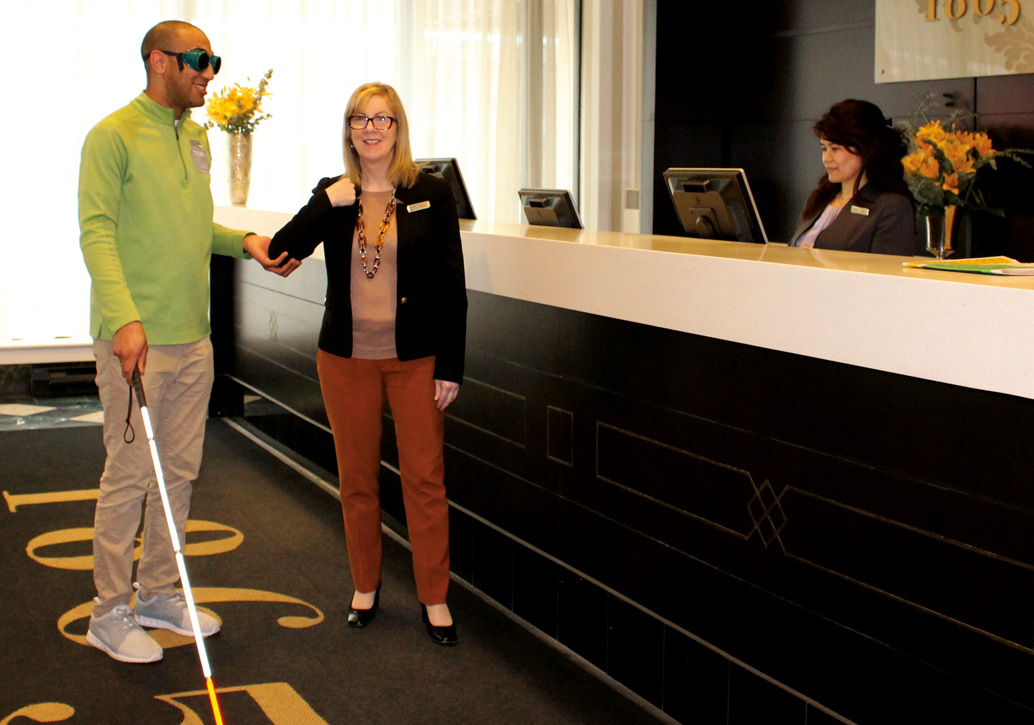Accessibility is not standardized in the hotel industry and can be easily interpreted in different ways
By Claire Steep
Last Thursday found me picking my way through the tangle of a College Street intersection in an effort to find the Chelsea Hotel, a mission that had me squinting at what signs there were in the gathering gloom.
I was torn between railing at the world (or perhaps only the city) for its approach to urban planning and laughing over the absurdity, because the reason I was trying to find the Chelsea Hotel was to talk accessibility with them. My difficulties weren’t their fault. I have partial sight and Toronto has, seemingly, an aversion to the use of street signs.
The Chelsea Hotel is Toronto’s largest, at 1,590 rooms. It’s also leading the way in accessibility when it comes to hospitality, something I can certainly appreciate. After all, years of living abroad have equipped me with travel experiences that range from the gracious (the Skye bed and breakfast owners, who drove me to Portree at the end of my stay rather than calling a taxi) to the frustrating (the airport attendant who condescendingly led me through security even as I assured her this was unnecessary) and the comedic (the Nether Stowey guest house that forgot to ask if I was left handed, leaving me to battle with a right-handed mug).
Dignity at its workable finest
Perhaps the most notable thing about the Chelsea’s gap accessibility program is how unobtrusive it is. As I check in, I’m offered the accessibility package. It’s simply a courtesy, as one might offer tea to guests. I’m not carrying a symbol cane or anything to tell them I can’t see. The hotel has simply made this a business policy. Among their various missions is a mandate to “Offer access to goods and services with independence and dignity.”
Over tea in the Market Garden café it’s explained that, as a matter of course, all staff are put through accessibility training. And, while some of it is as expected (such as how to guide those with vision loss or how to operate assorted assistive devices), employees are also required to try out devices. They’re encouraged to navigate not just around the floor, where it’s easy, but also up steep ramps and through narrow spaces. They experience doors, stairs, tables and chairs with walkers and navigational canes, and all the other obstacles their guests will encounter.
This is independence and dignity at its workable best, and also good business sense, because a hotel that caters this instinctively to my needs is one I’ll be recommending when friends with disabilities come to visit me. I can even tell my partially sighted friend there’s large-print options for menus, something I have yet to see anywhere else in the city.
Blue and green
As I turn away from the checkout, accessibility package in hand, I’m advised that I want the blue elevator bank to find my room. Standing in the lobby I have no idea where this is, but I quickly work it out, spotting a blue dot on the wall opposite. There’s another one further along, and that’s green. Take it from someone with a lifetime spent squinting upwards at signage—blue and green dots are much easier to see. I’m starting to think Toronto should adopt this system: Turn left at the green dot, right at the red one and continue until magenta. Or something. Anyway, for the first time I can remember, I have no trouble navigating around a strange hotel.
As with any project, accessibility at the Chelsea is an evolving effort. There are still areas due for revision to accommodate mobility-related disabilities, and recent work with Kerry’s Place has resulted in the production of fidget kits and storyboards for guests who fall on the autism spectrum. Innovatively, a mystery guest program
(I hope I’m invited to be a regular) also enables the hotel to perpetually reassess its success.
Rising to the occasion
Accessible rooms and all the rest aside, what’s most impressive is that a stay here continues to be about the people who visit and, if some of them come with a disability, the hotel and its staff will rise to the occasion. Yes, that’s hospitality 101, but take it from someone who knows the comedic value of the right-handed mug and the frustration of being seized by the elbow in airports—this unobtrusive accommodation is a rarity, and one well worth recognition. Who knows, it might even catch on.
Claire Steep read English at St Andrews University, Scotland, for 5 years. She blogs about books and music at choristerathome.com, and is currently a communications intern for Abilities.














